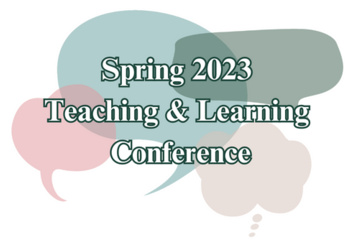We found 184 results that contain "2023-24"
Posted on: #iteachmsu

January's collaborative tools training opportunities
Check out January’s courses available at no cost to all students, faculty, and staff. Visit SpartansLearnfor more information and to register.
Featured Course of the Month
Microsoft Teams – Getting Started
Monday, January 13, 1:30 p.m.
Teams is one of the best tools at MSU for effective communication and collaboration. Join us as we dive into the basics and share how to chat and host meetings with individuals, groups, and entire teams.
What participants are saying…
“The general overview of the Teams features, and functionality was so helpful. I loved the exercises that demonstrated the features so well.”
January Schedule
To register for the following virtual instructor-led training courses go to SpartansLearn.
SharePoint for End Users
Wednesday, January 15, 10:00 a.m.
Join our live training to unlock the power of SharePoint! Discover its amazing features, effortlessly navigate the platform, create dynamic lists, and master the functionality of document libraries. Get ready for an engaging and hands-on learning experience.
Outlook – Calendar Basics
Tuesday, January 21, 9:30 a.m.
Outlook is not just for emails! In this exciting course, learn how to streamline your workflow and schedule using the Outlook calendar. Set up an Out of Office email, share your calendar with colleagues, and schedule meetings with multiple people without breaking a sweat using the Scheduling Assistant and Polls tools. Outlook – Calendar Basics is anything but basic!
Microsoft OneNote – Getting Started
Thursday, January 23, 10:00 a.m.
Get rid of your traditional pen and paper and uncover features of the most versatile note-taking tool, OneNote. Learn the basics of OneNote, a digital note-taking app that provides a single place for keeping all notes, research, plans, and information.
Microsoft Teams – Working with Teams
Friday, January 24, 10:30 a.m.
This hour-long course is valuable to individuals, teams, and departments looking for a centralized hub for communication, file sharing, and collaboration. Learn how to request a new team or join an existing team, manage channels and tabs, and manage the team’s members, settings, and analytics.
OneDrive – Working with OneDrive
Monday, January 27, 1:30 p.m.
Expanding on the basics of OneDrive, learn more about this great storage tool. Discover navigation strategies, explore the desktop app settings and options, manage accessibility of files and folders, and more.
Can’t attend a live course? Watch on-demand anytime at SpartansLearn.
Monthly office hours are available for those with questions about content shared in the courses. Find the schedule at SpartansLearn.
All participants are invited to share anonymous feedback about their course through our End of Course Survey. Your feedback is incredibly valuable to help shape and inform our future offerings. Congratulations, Nancy Spitzley in MSU IT Data Center Operations, our quarter 4 drawing winner for completing an End of Course Survey!
For any other questions about technology training, please contact train@msu.edu.
Featured Course of the Month
Microsoft Teams – Getting Started
Monday, January 13, 1:30 p.m.
Teams is one of the best tools at MSU for effective communication and collaboration. Join us as we dive into the basics and share how to chat and host meetings with individuals, groups, and entire teams.
What participants are saying…
“The general overview of the Teams features, and functionality was so helpful. I loved the exercises that demonstrated the features so well.”
January Schedule
To register for the following virtual instructor-led training courses go to SpartansLearn.
SharePoint for End Users
Wednesday, January 15, 10:00 a.m.
Join our live training to unlock the power of SharePoint! Discover its amazing features, effortlessly navigate the platform, create dynamic lists, and master the functionality of document libraries. Get ready for an engaging and hands-on learning experience.
Outlook – Calendar Basics
Tuesday, January 21, 9:30 a.m.
Outlook is not just for emails! In this exciting course, learn how to streamline your workflow and schedule using the Outlook calendar. Set up an Out of Office email, share your calendar with colleagues, and schedule meetings with multiple people without breaking a sweat using the Scheduling Assistant and Polls tools. Outlook – Calendar Basics is anything but basic!
Microsoft OneNote – Getting Started
Thursday, January 23, 10:00 a.m.
Get rid of your traditional pen and paper and uncover features of the most versatile note-taking tool, OneNote. Learn the basics of OneNote, a digital note-taking app that provides a single place for keeping all notes, research, plans, and information.
Microsoft Teams – Working with Teams
Friday, January 24, 10:30 a.m.
This hour-long course is valuable to individuals, teams, and departments looking for a centralized hub for communication, file sharing, and collaboration. Learn how to request a new team or join an existing team, manage channels and tabs, and manage the team’s members, settings, and analytics.
OneDrive – Working with OneDrive
Monday, January 27, 1:30 p.m.
Expanding on the basics of OneDrive, learn more about this great storage tool. Discover navigation strategies, explore the desktop app settings and options, manage accessibility of files and folders, and more.
Can’t attend a live course? Watch on-demand anytime at SpartansLearn.
Monthly office hours are available for those with questions about content shared in the courses. Find the schedule at SpartansLearn.
All participants are invited to share anonymous feedback about their course through our End of Course Survey. Your feedback is incredibly valuable to help shape and inform our future offerings. Congratulations, Nancy Spitzley in MSU IT Data Center Operations, our quarter 4 drawing winner for completing an End of Course Survey!
For any other questions about technology training, please contact train@msu.edu.
Posted by:
Caitlin Clover

Posted on: #iteachmsu

PEDAGOGICAL DESIGN
Interdisciplinary Course Design Resources from CIRCLE
In mid-November, CIRCLE hosted a workshop on interdisciplinary course design and teaching. It was a generative conversation that gave MSU educators interested in interdisciplinary teaching the chance to connect and share resources and tactics. We showcased 2 panelists with experience designing and teaching interdisciplinary courses: Erin Dreelin (Fisheries & Wildlife and Center for Water Studies) and Garth Sabo (Director of the Center for IAH). The panel discussed effective interdisciplinary course design, strategies to address potential challenges, and the potential benefits of interdisciplinary courses for instructors and students.This workshop's goal was for both new and seasoned interdisciplinary educators to move their own practices forward, from classroom strategies to evaluation of interdisciplinary teaching effectiveness. Participants had the opportunity to reflect on their own interdisciplinary teaching philosophies and work on individualized plans for interdisciplinary teaching.You can watch Garth Sabo's panel contribution video below, in which he describes some of his experiences plannign and teaching interdisciplinary courses. You can also access CIRCLE's interdisciplinary teaching resources at this link. Our resources include:
Harden's Ladder of Integration framework for interdisciplinary course design
a handout including the benefits, challenges, and institutional resources to support interdisciplinary teaching
a personalizable planning worksheet that you can print and complete
If you have any questions about interdisciplinary course design, you can contact Ellie Louson, CIRCLE's associate director of interdisciplinary teaching & learning (lousonel@msu.edu), or our panelists Erin Dreelin (dreelin@msu.edu) and Garth Sabo (sabogart@msu.edu). Save the date for our second interdisciplinary teaching & learning workshop, which will focus on co-teaching and collaboration on interdisciplinary teaching teams. It will be held February 14th 10AM-1PM (registration link TBA).If you are interested in further programming from CIRCLE, please apply to become one of our affiliates here: https://research.msu.edu/circle/affiliate-faculty-program (we accept applications on a rolling basis).
Harden's Ladder of Integration framework for interdisciplinary course design
a handout including the benefits, challenges, and institutional resources to support interdisciplinary teaching
a personalizable planning worksheet that you can print and complete
If you have any questions about interdisciplinary course design, you can contact Ellie Louson, CIRCLE's associate director of interdisciplinary teaching & learning (lousonel@msu.edu), or our panelists Erin Dreelin (dreelin@msu.edu) and Garth Sabo (sabogart@msu.edu). Save the date for our second interdisciplinary teaching & learning workshop, which will focus on co-teaching and collaboration on interdisciplinary teaching teams. It will be held February 14th 10AM-1PM (registration link TBA).If you are interested in further programming from CIRCLE, please apply to become one of our affiliates here: https://research.msu.edu/circle/affiliate-faculty-program (we accept applications on a rolling basis).
Authored by:
Ellie Louson

Posted on: #iteachmsu


Interdisciplinary Course Design Resources from CIRCLE
In mid-November, CIRCLE hosted a workshop on interdisciplinary cour...
Authored by:
PEDAGOGICAL DESIGN
Friday, Dec 20, 2024
Posted on: Spring Conference on Teaching & Learning

PEDAGOGICAL DESIGN
NOAA’s Science On a Sphere at the MSU Museum
Title: NOAA’s Science On a Sphere at the MSU MuseumPresenters: Carrie Wicker (MSU Museum)Date: May 11th, 2023Time: 11:30 am - 12:30 pmFormat: Learning Technology DemonstrationClick here to viewDescription:Community Engaged Learning is a teaching and learning strategy that integrates meaningful community partnerships with instruction and critical reflection to enrich the student learning experience, teach civic and social responsibility, and strengthen communities. This session will focus on connecting course objectives to creative experiential strategies for engaging students in social change. Through presentation and discussion, attendees will explore the Social Change Wheel, an equity-centered framework, which can help faculty practitioners develop a broad definition of community engaged learning. Come and explore the possibilities of integrating meaningful community partnerships into course design, wherein students deepen their understanding of course content through social change strategies, including philanthropy, advocacy, design-thinking, community organizing and more!
Authored by:
Carrie Wicker

Posted on: Spring Conference on Teaching & Learning


NOAA’s Science On a Sphere at the MSU Museum
Title: NOAA’s Science On a Sphere at the MSU MuseumPresenters: Carr...
Authored by:
PEDAGOGICAL DESIGN
Tuesday, May 16, 2023
Posted on: Spring Conference on Teaching & Learning

PEDAGOGICAL DESIGN
Excel accessibility 101
Presenter: Antoinette Tessmer (Business/Finance); Hannah Forest (MSU Senior - Psychology)Format: WorkshopDate: May 11th, 2023Time: 11:30 am - 12:30 pmClick here to viewDescription:We propose to offer a workshop on how to make Excel content accessible to screen reader users. The method that we will practice during the workshop was developed in summer 2020 in collaboration with two blind students. Since then, the material used in Financial Modeling courses (Broad college undergraduate and MBA courses) is now 99% accessible to blind participants. If your course involves some Excel content and you are interested in enhancing your content accessibility, please join the workshop. We will first explain and illustrate our method. A collaborative exercise will then be proposed during which partners will discuss how to improve the accessibility of a given Excel file. Ideas and results will be compared and contrast. We will ask a blind student to assess our work.
Authored by:
Antoinette Tessmer

Posted on: Spring Conference on Teaching & Learning


Excel accessibility 101
Presenter: Antoinette Tessmer (Business/Finance); Hannah Forest (MS...
Authored by:
PEDAGOGICAL DESIGN
Tuesday, May 16, 2023
Posted on: Spring Conference on Teaching & Learning

PEDAGOGICAL DESIGN
Incorporating Reflective Practices in Classrooms: Our Learning Assessment Model
Title: Incorporating Reflective Practices in Classrooms: Our Learning Assessment ModelPresenters: Salomon Rodezno, Dustin Petty (Bailey Scholars Academic Advisor, College of Agriculture and Natural Resources); Sarah Prior (Bailey Scholars Program Director, College of Agriculture and Natural Resources; Sociology Department, College of Social Science); Eric Abaidoo (Agricultural, Food, and Resource Economics, College of Agriculture and Natural Resources); Salomón Rodezno (Educational Administration, College of Education) A.L. McMichael (Director, LEADR; History and Anthropology, College of Social Science); Harlow Loch (Accounting Department, Eli Broad College of Business); Reva Durr (Educational Administration, College of Education); Guanglong Pang (Educational Administration, College of Education); Brandy Ellison (Center for Integrative Studies in Social Science, College of Social Science)Format: WorkshopDate: May 11th, 2023Time: 2:45pm - 3:45pmClick here to viewDescription:Reflective practices emotionally connect learners to their classroom experiences. This connection increases self-efficacy, retention, and integration of content. Incorporating reflective practices meaningfully into learning spaces and syllabi can be elusive given the substantive demands of the curriculum and the temporal limits of the semester. This workshop will address the benefits and challenges of using reflective practices as a central component of the assessment and/or grading processes. Bailey Scholars Graduate and Faculty Fellows will share their experiences using reflective practices in their classes within and beyond the Bailey Scholars Program.
Authored by:
Salomon Rodezno

Posted on: Spring Conference on Teaching & Learning


Incorporating Reflective Practices in Classrooms: Our Learning Assessment Model
Title: Incorporating Reflective Practices in Classrooms: Our Learni...
Authored by:
PEDAGOGICAL DESIGN
Wednesday, May 17, 2023
Posted on: Spring Conference on Teaching & Learning

PEDAGOGICAL DESIGN
Welcome to my classroom: COIL
Title: Welcome to my classroom: COILPresenters: Antoinette Tessmer, Guanglong Pang (Education)Format: WTMCDate: May 11th, 2023Time: 2:45 pm - 3:45 pmClick here to viewDescription:COIL is an innovative online tool for international and intercultural learning among instructors and learners. It allows instructors and learners to enjoy many benefits of international and intercultural learning without the costs and implications of international travel. However, designing and running a successful COIL activity remains challenging because such a task is non-traditional, often requiring instructors to plan and teach outside of their comfort zone. We propose to run a COIL activity with a mock group of remote partners. Attendees will be grouped with remote collaborators to complete a collaborative project. Our session comprises steps that are typically present in a COIL activity. Attendees will participate in (a) an ice breaker activity followed by (b) a group discussion to identify a common topic based on their shared teaching/research interests. Groups will (c) brainstorm a hands-on project related to their topic. We then invite groups to (d) share their ideas with others. We will end with a general discussion about the logistics, challenges and lessons learned while participating to the COIL activity. As teleconference technology will be needed, participants will need to bring a laptop. We recommend that interested participants consider attending the “Workshop: COIL” session as an introduction to this “Welcome to My Classroom: COIL” session.
Authored by:
Antoinette Tessmer

Posted on: Spring Conference on Teaching & Learning


Welcome to my classroom: COIL
Title: Welcome to my classroom: COILPresenters: Antoinette Tessmer,...
Authored by:
PEDAGOGICAL DESIGN
Wednesday, May 17, 2023
Posted on: Spring Conference on Teaching & Learning

PEDAGOGICAL DESIGN
Teaching and Learning about Data Through Stories: An Interdisciplinary Perspective
Title: Teaching and Learning about Data Through Stories: An Interdisciplinary PerspectivePresenters: Lee Melvin Peralta (College of Education); Louise Jezierski (James Madison College)Format: Paper PresentationDate: May 10th, 2023Time: 10:00 am - 11:15 am Room: 3201, Stem BuildingDescription:In a 2018 report on data science education, the National Academies of Sciences, Engineering, and Medicine recommended that academic institutions encourage all undergraduate students, regardless of their backgrounds or career goals, to develop a basic understanding of data literacy and data science. In this paper, we build on the literature on undergraduate data literacy and data science education by discussing emerging findings from a new interdisciplinary course on data storytelling. The course was a freshman and sophomore research seminar involving the collaborative development of a survey instrument and the creation of corresponding data-driven stories. Through the survey, students sought to understand other undergraduate students' perspectives on the topics of food insecurity, healthcare, and economic mobility--topics that were chosen by the students and presented through various data visualizations. The course emphasized the role of stories, not only in representing the results of data analysis but also in understanding research practices through a storytelling lens. Recent literature suggests the importance for students to develop technical competency with data alongside an understanding of the sociopolitical and ethical dimensions of data. Emerging findings from the data storytelling course suggest an opportunity to leverage storytelling practices toward supporting students in developing a critical and creative orientation toward data. By attending to narrative structure, the materiality of storytelling, and the affective dimensions of stories, students were not only able to develop technical and critical skills toward data but also to address broader epistemological and ontological questions about the nature of knowledge production.
Authored by:
Lee Melvin Peralta

Posted on: Spring Conference on Teaching & Learning


Teaching and Learning about Data Through Stories: An Interdisciplinary Perspective
Title: Teaching and Learning about Data Through Stories: An Interdi...
Authored by:
PEDAGOGICAL DESIGN
Monday, May 1, 2023
Posted on: Spring Conference on Teaching & Learning

JamBoard: Where Academic and Intellectual Collaboration Meets Creativity
Title: JamBoard: Where Academic and Intellectual Collaboration Meets CreativityPresenter: Gloria J. AshaoluFormat: Paper PresentationDate: May 11th, 2023Time: 10:15 am - 11:15 amClick here to viewDescription:The advent of the “dramatically amplified” and increased incorporation of digital technological teaching methodologies in classes (Sweeney et. al., 2021) has meant that the use of digital whiteboards has been on the rise. Google’s Jamboard is a collaborative digital whiteboard where students can exchange and record ideas generated during collaborative discussions. Furthermore, the wide arrays of tools (pens, markers, highlighter, sticky notes, text boxes, image upload, etc) allow students to document their thoughts in ways that encourage and empower them to creatively express their ideations—and see their peer’s creations in real-time. Given that Jamboard is free for all Google users and has a relatively easy-to-use interface, it can be a good tool to utilize when engaging in in-class (in-person or remote) collaborative discourse and other forms of diagnostic and formative assessments. This presentation engages with how Jamboard can help facilitate a learning experience where students evaluate, and in their own words, produce answers and create visual aids that allow them to synthesize the course content they are introduced to. This presentation also delves into the limitations of Jamboard—as well as creative means to work around some of these constraints. As with any teaching tool, student engagement and performance ought to be a priority. That said, through the use of a case study, this presentation also discusses how Jamboard can be used to gauge student learning and understanding and develop interventions as informed by the principle of design thinking (empathize, define, ideate, prototype, test, and implement).
Authored by:
Gloria J. Ashaolu

